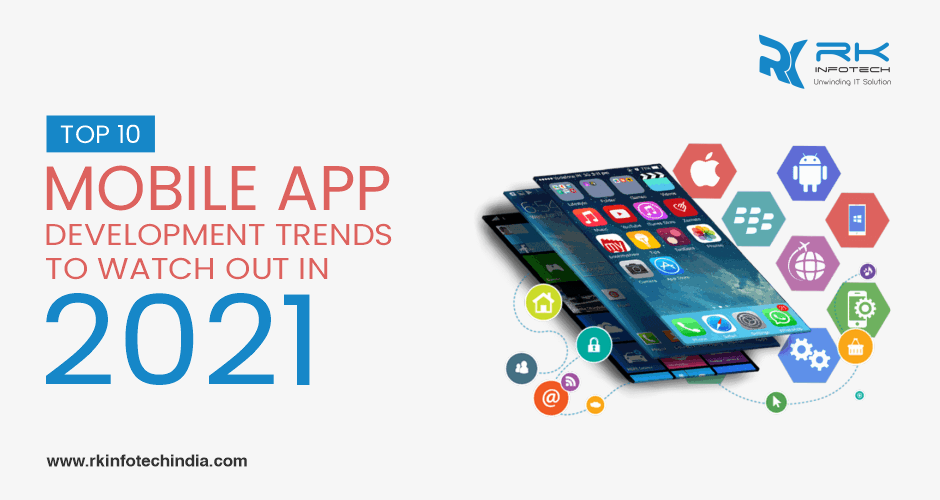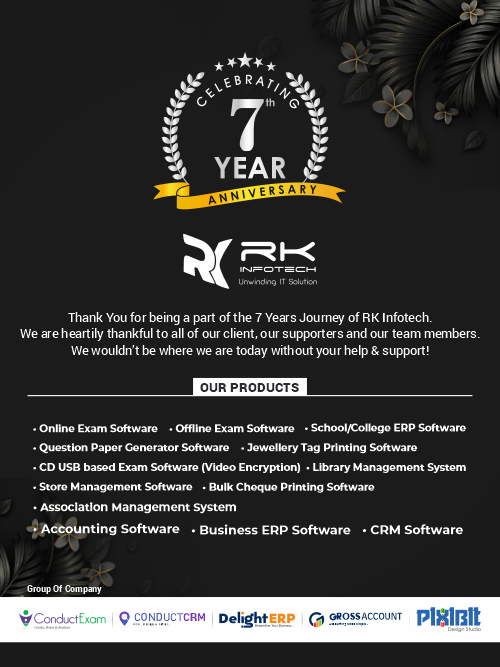Top 10 Mobile App Development Trend to Watch Out in 2021
Introduction
The mobile app development market is in its infancy and there is no telling how big it will become in the years to come. Developers are racing to create the best mobile apps with every platform under the sun. Mobile app development is growing steadily. Trends suggest that smartphone users are using their phones to access apps more often — possibly even for place-based services.
The use of mobile applications for shopping, navigation, weather, entertainment, and other purposes is accelerating. With the help of new technologies and business models, mobile app developers are able to cater to growing demands from customers worldwide.
As more and more people turn to their mobile phones for information and services, app developers will have to adapt their offerings or risk falling behind. Mobile application development is a fast-paced field that offers unlimited opportunities for anybody with creativity and tenacity.
Read more : it is worth to build mobile app for your business?
What is mobile app development?
Mobile app marketing and development have evolved substantially in the past few years. In this post, I will briefly cover mobile app development along with a few key terms. What is mobile app development? Mobile app development is to develop (create) an application (for any platform) that can be distributed via a mobile device. Platforms include iOS, Android, and Blackberry OS.
Mobile app development is the application of mobile technologies and designs to desktop applications, network services, and other platforms. Mobile applications have become a staple of business and technology. A successful mobile application tends to be more associated with the high-tech sector than its desktop counterparts.
Mobile app development is a rapidly growing field. App developers have a better chance of making a living from their apps if they develop them for smartphones and tablets rather than desktop computers. A high-quality mobile app can be more appealing to both consumers and app developers than a similar application designed for a desktop computer.
Mobile app development is a hot topic right now. The popularity of mobile apps has increased dramatically over the past few years. Mobile apps are more powerful and efficient than websites and help businesses compete with the giants of the industry. The success of any mobile app depends mostly on the tech that is used to create it.
However, there is a lot of confusion around it. Mobile app development has come a long way with ease, speed, and accessibility being key factors. Ever since the first mobile applications, these applications have been a platform for social interaction.
With the advent of social media and mobile apps, businesses have recognized the need to develop more personalized tools for their clients. With gaining more popularity, mobile app development has increased in importance and demand. It could be said that design plays a crucial role in increasing conversions and engagement with a mobile application.
Top 10 mobile app development trend
Internet of Things (IoT)
“Internet of Things” has been happening for a long time: starting with the telephone, the postal service, and so on. Each one of them employed some form of a mobile application during its inception. These applications were then superseded by work-centric applications that can be used in the office as well as at home. The interesting thing, however, is that IoT mobile applications, in spite of their move from being primarily mobile applications, have not been exactly replaced – at least not yet.
There are still plenty of people using their smartphones right now to search for information about utility bills, package delivery times, etc. These apps connect to various types of sensors and devices, such as warehouse door locks, lightbulbs, or sensors that alert you to motion or temperature changes. The connected motion and temperature sensors can then be used to control devices in your home or office.
Whether these applications are purely for smart home or business control, or whether they have other features like vehicle tracking capabilities or location-based services, these new ecosystem apps continue to disrupt our traditional view of the Internet of Things (IoT) and how we interact with it.
Artificial Intelligence and Machine Learning
Artificial intelligence and machine learning have created a wide array of mobile applications that are helping to transform how we interact with technology. Whether you’re searching for information on Google or Uber, booking travel options on Waze, or interacting with a virtual assistant on Skype, AI and ML-powered applications are poised to change how people live, work, and spend their lives.
These AI/ML-owned apps are still in the infancy of the mobile app revolution. The apps still need to be developed, optimized, and tested by the masses before they will gain wider acceptance. That being said, there already exists a promising field of applications compatible with virtually all smartphones (so-called “applications”). However, what is useful is the pace at which Artificial Intelligence and machine learning is progressing in the last decade.
Increasingly, AI applications are being applied to the design of mobile applications (e.g. Uber and Lyft) and in recent years, AI has become a large part of what is available for business.
Augmented Reality and Virtual Reality
Augmented reality and virtual reality mobile applications will enable people to enjoy services that were previously inaccessible. This will improve the quality of life of everyone on the planet. They will be able to get around streets that would otherwise be impassable and be able to experience things that weren’t possible before.
Augmented reality will also help with many other things that have yet to be discovered. Augmented reality could bring a whole new level of immersion to all types of content. Whether it be via a new type of gaming device or an entirely new entertainment experience, AR technology will grow and advance at a faster pace than ever before. Mobile devices are no longer just the devices we carry with us so we can access the Internet, it’s also a powerful tool that companies can use for marketing purposes.
These new multimedia applications have been enjoyed by hundreds of millions of people around the world. These new forms of entertainment are mainly provided by third-party apps that offer additional content on top of what we already know and love.
Enterprise Mobile App Development
Enterprise mobile applications provide customers with a single point of access to all their information from one secure, easy-to-use platform. These applications enable business continuity and allow users to work with teams or with clients from anywhere in the world via searchable and customizable contact lists. Mobile applications have become an essential component of today’s business productivity.
Their popularity is driving demand for more mobile application development resources and services. Enterprise mobile application development is an umbrella term referring to the creation of application software for small and medium-sized businesses (SMBs) on iOS or Android-based mobile devices. These applications typically feature software applications, link to third-party services, and may offer personalization, marketing capabilities, or other capabilities that make them more integrated into the traditional business operations used by many companies today.
Mobile applications enable companies to reach customers where they are with great product or service experiences tailored for their needs regardless of where they are physically located.
Bacon Technology
Bacon Technology is located in sunny Austin, Texas and we are committed to keeping you informed about new developments in the industry. When we launched our website, we had no idea that it’s going viral. That’s how people found out about us, came to our website, and started doing research on us. We are now part of Google AdWords (one of the most used search phrases in the world) and have many clients that make use of our mobile applications and desktop applications.
We have developed several mobile application programs which can easily be used to pay bills, manage finances, find coupons and apply for loans online. Bacon Technology is a renowned provider of proprietary mobile software and services to logistics, physical distribution and distribution fulfillment, commodity supply chain management service supply chain protection, and asset tracking services.
The company is a leader in providing a comprehensive set of mobile solutions for fulfillment and freight forwarders to facilitate real-time monitoring of operational capabilities.
Blockchain base mobile app development
Blockchain mobile applications, in the context of the present invention, are applications that are hosted on a blockchain and can execute higher-level logic, typically to control a physical device. Blockchain mobile applications can be broadly defined as apps that integrate with a blockchain network.
An MVP typically has limited functionality but allows developers to rapidly prototype and test innovative blockchain solutions. By using a decentralized mobile app development platform, brands can easily launch revenue-generating services without having to worry about technical infrastructure or adhering to strict business regulations.
Mobile applications have quickly emerged as one of the most effective means for adding value to blockchain infrastructure. With well over one hundred mobile applications already being developed and available for download on Google Play Store, there is no lack of application. However, many developers have taken the risk of crafting an application without first understanding it from the ground up.
Cloud Integration
Cloud integration mobile applications can increase your reach, improve customer experience and help you reach your monthly sales goals. But whether or not they make your workload easier can be difficult to determine. In the mobile advertising industry, companies are moving away from a static blog platform approach in favor of more dynamic campaigns that smooth the path between campaign creation and script execution.
It provides a secure environment that embraces the creativity and technology of the end-user — ensuring that data is available to them in the most searchable form and in as little time as possible. For organizations that choose to implement Cloud Integration, the result is faster responses to user requests, increased flexibility for administering shared resources, and much more.
Cloud integration is used by many large firms such as Amazon, Microsoft, and Google as well as startups in industries such as media and education where scalability and high performance are requirements. There are different ways your organization can integrate the Cloud including using virtual private servers (VPS) or hosted servers.
Geolocation Based Mobile App Development
Geolocation-based apps are mobile applications that use geostationary satellite technology combined with GPS devices to display the locations of mobile devices at locations of interest. The goal of geolocation-based apps is to provide consumers with a more convenient way to get around geostationary satellites. Apps mobile applications have great geographical location based on your location and time zone preference.
They find mobile users because of their location and browsing patterns. Also, geolocation-based apps eliminate the need for a physical visit seeking networking or establishing a connection with your customer. Customers in developing countries are mobile users and they have low data plans thus, faster and better information is available.
Mobile applications are exploding. They are one of the factors that have made smartphones popular. Geolocation-based apps are a big part of this explosive growth. There are hundreds of thousands of apps available for Android, iOS, and Windows Mobile but few can produce as much engagement as geolocation-based apps. They create location-based content that people find very personal.
Mobile Wallets
A mobile wallet app is a service that allows payments to be made from the user’s bank account directly on the smartphone. The payment can then be made either directly or directly to another company’s bank account for local or overseas transactions. There are a number of mobile wallet applications currently available on the market. The most recognizable among them is PayPal Mobile, which was launched by PayPal in June 2010.
This application is now owned by Braintree, Inc., a company that provides the same service but on a more sophisticated level. Wallets have emerged as an important and growing area of internet business. As of today, there are over 1600 mobile wallets accepted worldwide.
Mobile wallet applications are breaking through the digital security barrier that had been built around traditional bank accounts and other traditional payment solutions. This agile and distributed community of users, developers, and institutions has borne fruit with the development of hundreds of valuable apps.
Wearable
Wearable mobile applications enable users to automate and connect various devices, thus creating new possibilities for various industries such as healthcare, transportation, logistics, and education. In point of fact, it might be possible to solve many health care problems with it.
Within the last year, there has been an increase in the amount of wearable mobile applications that have been popping up. These are handheld wireless devices that simulate the functionality of a smartwatch but have some additional features.
They are a great way of taking your phone with you anywhere and allowing you to do things like send WhatsApp messages, make calls, check your calendar, and even pay for things with it just as if it was a normal watch, but attach a unique property to it.
Read more : Top 9 benefits of having mobile app for E – commerce
Conclusion
Mobile apps are primarily used for communication and personal transportation applications are on the rise. There’s no denying the strong potential of mobile applications to become one of the most popular user experiences in the world.
This is why it’s essential to create a solid strategy for your mobile app project. These tips and guidelines will help you get started with setting up your mobile app, creating an effective marketing plan, tracking user engagement, and more! The mobile app market is growing at a strong pace and there are some new players entering it every day and others standing out for their uniqueness. These apps look cute, they sound cute, they are intuitive and users love them.
There are now tons of apps available for all kinds of devices in the market and it’s getting hard to choose one as the best choice. The mobile app development trends presented here will help you in building your own unique app and making it stand out from the crowd. By 2021, the mobile app population is expected to reach over 1B and this is expected to continue to grow.
Since there are not that many user-oriented applications out there, most app developers are focusing on what works well with mobile devices and creating mediums such as SMS and social networks as well as native apps. Forget about building custom desktop applications or apps designed for one device or platform. Instead, mobile apps are the new hotness. And let’s be honest.
The mobile app market is bigger than ever with a billion downloads per day in just a few countries. It’s exploding, and if you aren’t part of this booming industry yet, you better get on board soon or be left behind as other industries figure out how to adapt and succeed.








